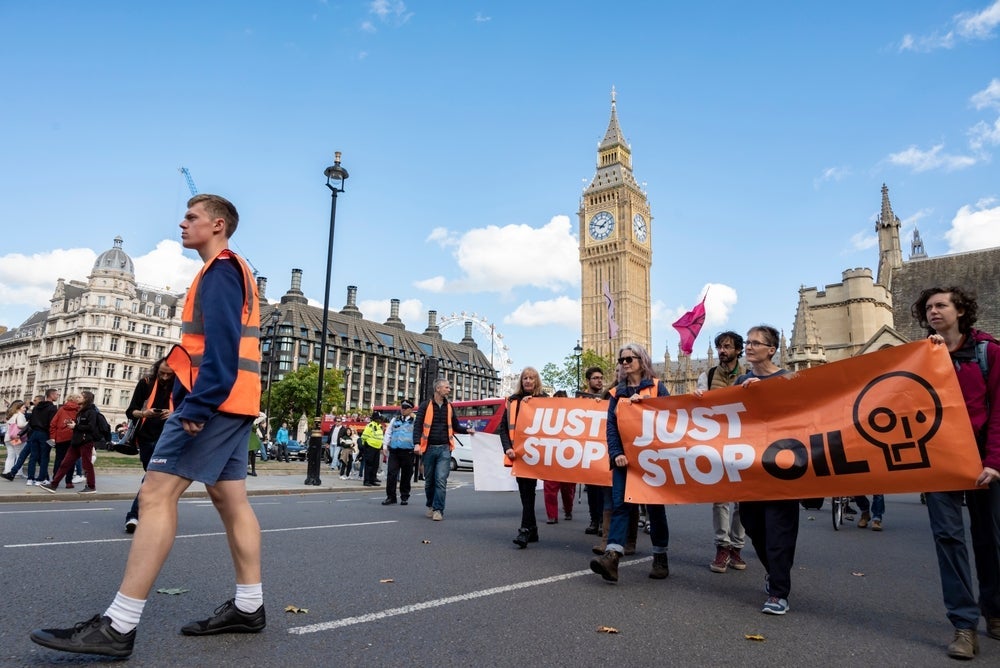Unlike many other measures of sustainability performance, the UK is one of the leading prosecutors of climate activists.
Changing public attitudes to sustainability, focusing on the feasibility and purpose of climate action, represents a dangerous and problematic shift. With more questions being asked about the various national, international, and multilateral climate agreements, ESG agendas are in a tough spot. Issues surrounding the perception of sustainability help to reiterate the importance of communication and stakeholder engagement going forward. If holistic and global climate action is to succeed in the long term, climate activism must adapt.
ESG going back to the Dark Ages
The criminalisation and repression of climate activism and protest is a dangerous and growing global phenomenon. Campaigns like Just Stop Oil and groups like Extinction Rebellion have become more subject to organised crime legislation and other extended police powers, resulting in a UK arrest rate almost three times as large as the global average. Globally, only Australia arrests people more frequently at eco-protests. New offenses, broadened definitions, and greater police authority have all widened how climate protesters may be caught.
Furthermore, two now-imprisoned Just Stop Oil protesters tried under Section 7 of the Public Order Act 2023 were restricted from mentioning their motivation for engaging in protest and from mentioning the climate crisis. Section 7 bans any act preventing access to ‘national infrastructure’, providing an offensive tool for authorities to crack down on any protest at their discretion. Rather than addressing climate action or enabling those seeking to speak up for the environment, states instead focus on dissent, repression, and imprisonment.
ESG getting stuck in the mud
Prosecution and poor treatment of climate activists reflects wider issues surrounding the perception of ESG. The UK Department for Energy Security and Net Zero (DESNZ) published its Public Attitudes Tracker, which tracks public awareness, attitudes, and behaviors toward DESNZ policies. It found that the proportion of people who ‘knew a lot or had a ‘fair amount of’ awareness of the concept of ‘Net Zero’, had fallen since summer 2024. The public perception of climate action is intrinsic to its success and apathy or ignorance will impede its progress.
More problematically, between H1 2023 and H1 2024, people were more negative (37%) than positive (23%) concerning the short-term impact of tackling climate change on how the UK produces and uses energy in homes, businesses, and transport. While more than half of people were positive about the long-term impact of Net Zero on the UK, the proportion expecting long-term negative impacts also grew to 20%. Attention must thus be drawn to how to communicate the extensive benefits to society that climate agendas bring.

US Tariffs are shifting - will you react or anticipate?
Don’t let policy changes catch you off guard. Stay proactive with real-time data and expert analysis.
By GlobalDataSustainability – back to the drawing board
A YouGov H1 2024 assessment of consumer attitudes and behaviours regarding sustainability found that 28% of Britons actively show ‘little concern’ for climate change and sustainability initiatives. The impetus for climate action is, thus, present and established. This percentage poses a significant challenge to businesses and policymakers trying to grow the appeal of sustainability.
If climate action is to regain any momentum, reduce needless arrests, and secure the change it desires, concern for the environment and the capacity for all to enact climate-positive change must be significantly re-emphasised.
Already, 45% of Britons do not believe financial services providers make sufficient efforts to minimise their environmental impact, with this figure rising to 50% for banks, 55% for tech companies, and 67% for the airline industry. Given the extent of criticism for lack of action levied at several industries in the UK, the response to those activists who seek action seems both unjustified and unwanted by the public.
Climate action and sustainability more broadly must be re-interpreted to emphasise the positive outcomes for all. Crucially, it must begin with preventing the needless prosecution of climate activism.






